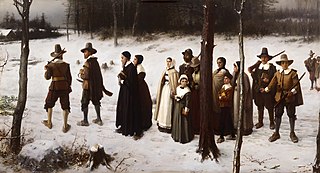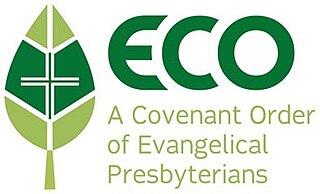
The Lutheran Church—Missouri Synod (LCMS), also known as the Missouri Synod, is a traditional, confessional Lutheran denomination in the United States. With slightly under 2 million members, it is the second-largest Lutheran body in the United States. The LCMS was organized in 1847 at a meeting in Chicago, Illinois, as the German Evangelical Lutheran Synod of Missouri, Ohio, and Other States, a name which partially reflected the geographic locations of the founding congregations.
The Evangelical Lutheran Church in America (ELCA) is a mainline Protestant Lutheran church headquartered in Chicago, Illinois. The ELCA was officially formed on January 1, 1988, by the merging of three Lutheran church bodies. As of 2019, it has approximately 3.3 million baptized members in 8,972 congregations.

The Wisconsin Evangelical Lutheran Synod (WELS), also referred to simply as the Wisconsin Synod, is an American Confessional Lutheran denomination of Christianity. Characterized as theologically conservative, it was founded in 1850 in Milwaukee, Wisconsin.

The American Association of Lutheran Churches is an American Lutheran church body. It was formed on November 7, 1987, as a continuation of the American Lutheran Church denomination, the majority of which merged with the Lutheran Church in America and the Association of Evangelical Lutheran Churches to form the Evangelical Lutheran Church in America. The AALC offices were originally in Bloomington, Minnesota. The national office moved to Fort Wayne, Indiana, in 2007. As of 2008, it had 67 congregations, with about 16,000 members. In 2020, the denomination listed 59 congregations. Its current Presiding Pastor is the Rev. Dr. Curtis E. Leins.
The Confessing Movement is a lay-led conservative Christian movement that opposes the influence of liberalism and progressivism within several mainline Protestant denominations and seeks to return them to its view of orthodox doctrine.

The Church of the Lutheran Confession (CLC) is a conservative Christian religious body theologically adhering to confessional Lutheran doctrine. Founded in 1960 in Minnesota, it has approximately 85 congregations in 24 U.S. states, and missions in Canada, India, Africa, Nepal, and Myanmar.

The Evangelical Lutheran Synod (ELS) is a US-based Protestant Christian denomination based in Mankato, Minnesota. It describes itself as a conservative, Confessional Lutheran body. The ELS has 130 congregations and has missions in Peru, Chile, India, South Korea, Ukraine, Czech Republic, and Latvia.

Confessional Lutheranism is a name used by Lutherans to designate those who believe in the doctrines taught in the Book of Concord of 1580 in their entirety. Confessional Lutherans maintain that faithfulness to the Book of Concord which is a summary of the teachings found in Scripture, requires attention to how that faith is actually being preached, taught, and put into practice. Confessional Lutherans believe that this is a vital part of their identity as Lutherans.
The Lutheran Church of Central Africa or LCCA is a Christian denomination of the Lutheran tradition based in the African countries of Zambia and Malawi. Currently (2004), it consists of over 40,000 baptized members in 200 congregations spread throughout both countries.

Lutheran Congregations in Mission for Christ (LCMC) is an association of Lutheran congregations in the United States. It describes itself as an affiliation of autonomous Lutheran churches and not a denomination. It began in 2001 in response to some liberal views of the Evangelical Lutheran Church in America (ELCA). LCMC is characterized by the stances it takes on Lutheran polity, biblical authority, and human sexuality. The group describes itself as "centrist" or "mainstream", noting that it stands between the more liberal ELCA and the more conservative Lutheran Church–Missouri Synod (LCMS) and other Lutheran church bodies in North America.

The Evangelical Lutheran Synodical Conference of North America, often known simply as the Synodical Conference, was an association of Lutheran synods that professed a complete adherence to the Lutheran Confessions and doctrinal unity with each other. Founded in 1872, its membership fluctuated as various synods joined and left it. Due to doctrinal disagreements with the Lutheran Church–Missouri Synod (LCMS), the Evangelical Lutheran Synod (ELS) and the Wisconsin Evangelical Lutheran Synod (WELS) left the conference in 1963. It was dissolved in 1967 and the other remaining member, the Synod of Evangelical Lutheran Churches, merged into the LCMS in 1971.

The Evangelical Lutheran Free Church is a confessional Lutheran denomination based in Germany and Austria. It currently consists of 1,300 members in 17 congregations. The ELFK maintains a seminary for the training of pastors in the city of Leipzig.

The Independent Evangelical-Lutheran Church is a confessional Lutheran church body of Germany. It is a member of the European Lutheran Conference and of the International Lutheran Council (ILC). The SELK has about 33,000 members in 174 congregations. The seat of SELK is in Hanover.

The Lutheran Churches of the Reformation (LCR) is an association of Lutheran congregations. The LCR has its roots among groups of Lutherans that broke with the Lutheran Church–Missouri Synod (LCMS) in the middle of the 20th century, and was formally incorporated in 1964. Church services are generally traditional and reverent in the style of the mid-1900s conservative Christians.

The Protes'tant Conference is a loose association of Lutheran churches and churchworkers in the United States. It was organized in 1927 by former members of the Wisconsin Evangelical Lutheran Synod (WELS) who had been suspended following an intrasynodical controversy. It currently consists of six churches and their churchworkers in Wisconsin, Michigan, and California.

Baptists do not have a central governing authority, and Baptist beliefs are not completely consistent from one Baptist church to another. However, Baptists do hold some common beliefs among almost all Baptist churches.

Lutheranism is one of the largest branches of Protestantism that identifies with the teachings of Martin Luther, a 16th-century German reformer whose efforts to reform the theology and practice of the church launched the Protestant Reformation. The reaction of the government and church authorities to the international spread of his writings, beginning with the 95 Theses, divided Western Christianity. During the Reformation, Lutheranism became the state religion of numerous states of Northern Europe, especially in northern Germany and the Nordic countries. Lutheran clergy became civil servants and the Lutheran churches became part of the state.

Protestantism is the largest grouping of Christians in the United States, with its combined denominations collectively comprising about 43% of the country's population in 2019. Simultaneously, this corresponds to around 20% of the world's total Protestant population. The U.S. contains the largest Protestant population of any country in the world. Baptists comprise about one-third of American Protestants. The Southern Baptist Convention is the largest single Protestant denomination in the U.S., comprising one-tenth of American Protestants. Twelve of the original Thirteen Colonies were Protestant; Maryland was the only Catholic one.

ECO: A Covenant Order of Evangelical Presbyterians is an evangelical Presbyterian denomination in the United States. As a Presbyterian church, ECO adheres to Reformed theology and Presbyterian polity. It was established in 2012 by former congregations and members of the Presbyterian Church (USA), abbreviated PC(USA). Dissatisfaction with the declining membership of the PC(USA) along with growing denominational disputes over theology and bureaucracy led to the founding of ECO. In 2018, ECO has over 383 congregations, 129,765 members and over 500 pastors.

Criticism of Protestantism covers critiques and questions raised about Protestantism, the Christian tradition which arose out of the Protestant Reformation. While critics praise Protestantism's Christ-centered and Bible-centered faith, Protestantism is faced with criticism mainly from the Catholic Church and some Orthodox Churches, although Protestant denominations have also engaged in self-critique and criticized one another.










